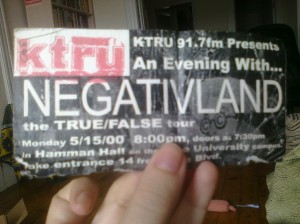I am currently in Ecuador on a Watson Fellowship, which is a year abroad working on an independent, non-academic project. Mine is creating an audio podcast about nature. Last year I also received a National Science Foundation Graduate Research Fellowship (funding for grad school), so I’m faced with the nice position of trying to decide which of the top ecology graduate school programs I want to attend next fall. My experience at KTRU was absolutely integral to these current and future successes. Through its unique spirit and the amazing friendships I formed at the station, it has also hugely influenced my personality, but that’s too intangible and profound to address in an email.
As I’ve written in so many personal statements and essays, I had absolutely no experience with radio, journalism, or student leadership going into my sophomore year. Yet when I approached KTRU to ask if I could interview professors about their research, I was immediately appointed News Director, and learned about all of these things on the fly. I started a weekly show that, granted, was pretty terrible. But after three years of steady improvement it was something I was very proud of; see <http://eat-the-crayon.tumblr.com>. And not only had I learned the specialized skills of a radio reporter, but I also learned how to create something from the ground up, how to manage people (I was also co-DJ Director senior year), and how to communicate (for a future scientist, this is a rare skill). I also gained the self-confidence that comes along with those lessons. My receipt of the Watson is a direct product of my experience at KTRU in too many ways to name, and those experiences definitely supplemented my research accomplishments to allow me to receive the NSF.
Neither leadership nor journalism are unique to KTRU, but there was an incredible amount of responsibility in the hands of students who, for a few hours each week, controlled 50,000 watts of radio power, and for a student like me who was in charge of all the DJs, that responsibility was much higher. Few student organizations have such a tangible, constant, and obvious connection to the world outside the hedges, and the fact that music was the point of that connection does not diminish its power. That awesome responsibility has now disappeared. “Internet radio” is not radio; if it were, then why can’t KUHF save themselves the money and broadcast classical music online? How is it sensible for them to want another tower and nonsensical for us to say that internet radio isn’t the same?
Despite what the Rice official media department says, an online-only KTRU will be a mere shadow of its former self. I can tell you with 100% certainty that my work at KTRU has made me who I am today, and I truly believe that experiences as profoundly life-changing as mine won’t happen with the new KTRU, because the responsibility that we held as leaders of a powerful radio station is gone. Out of all the reasons that the sale of the station upsets me, this is what I mourn the most. It probably goes without saying that I will never make a donation to Rice, which saddens me a great deal because my experience there was so excellent.
Rice: good luck profoundly changing students’ lives with a new servery.
Sincerely,
Carina Baskett
2010
Martel College
News Director 2007-2010, DJ Director 2009-2010
PS: One time a guy called during my shift and told me that KTRU saved his life. “Twenty years ago I was driving around and thinking about killing myself. I was flipping around the dial and came across Walking On The Moon by The Police. No one else was playing that kind of thing back then, and I was totally blown away. I decided not to kill myself.”



